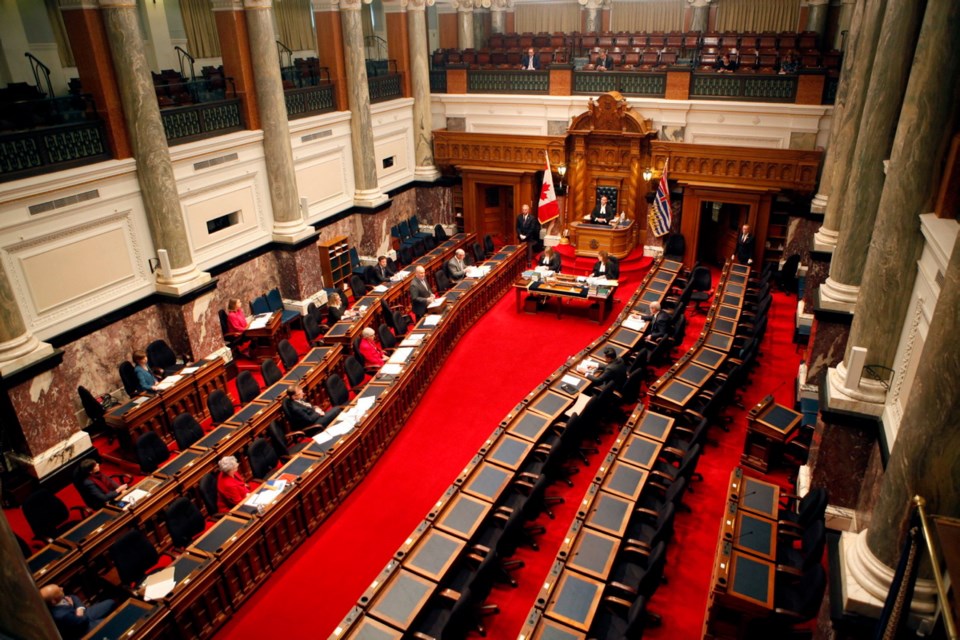The first order of business at the last sitting of the legislature for the foreseeable future was to change a rule.
MLAS have to sit in their assigned seats. No exceptions. But they’re too close together for the two-metre rule to apply. So the rule was changed, and a handful of sombre MLAs scattered themselves in the 87-seat assembly hall to comply.
The second was more difficult. It was coming to grips with how incomprehensible the situation is. Over a few hours of debate on the biggest emergency spend in provincial history, they all made reference to how staggering the impact is.
“Could any of us have imagined a few weeks ago being in the situation that we’re in?” said Finance Minister Carole James, echoing Health Minister Adrian Dix.
The legislature routinely passes an interim spending bill to tide government through the couple of months it takes to scrutinize, debate and pass the full budget.
But Monday’s sitting approved spending to cover nine months — $37 billion — plus the $5 billion in the emergency funding announced hours earlier.
It amounted to rewriting the budget on the fly, with only the haziest notion of what will really be needed, and the full expectation that it will likely be far more.
Liberal MLA Jas Johal tried to describe the enormity of the crisis the bill is designed to ease. A business survey found three-quarters of enterprises are expecting a 50% drop in their revenue. One-quarter are expecting 100% — a total collapse.
The hospitality sector projects that 15% of B.C.’s restaurants could close permanently in the worst case scenario.
The other job at hand was to change employment law so that workers cannot be fired for following health directives and not showing up on the job.
The bill provides unpaid — repeat, unpaid — job-protected leave to employees during the crisis.
Public Safety Minister Mike Farnworth said: “During this crisis, no employee will lose their job or be fired for following an order of the provincial health officer or for needing to care for a child whose school is closed.”
It covers anyone who is self-isolating by order, or just following guidelines. It also applies to employees unable to return to B.C. due to travel restrictions. It’s open-ended and can be broadened as needed.
As well, it is retroactive to Jan. 27, the date of the first case in B.C. So it covers any employees who have been terminated because they were self-isolating.
“Their employer will be required to offer them their same or comparable job back,” said Farnworth.
The final part provides three days unpaid, job-protected leave each year for personal illness or injury. It will be on-going, not related to the pandemic.
He acknowledged B.C. is catching up to Ontario, Alberta and Saskatchewan with the bill.
There were some unusual personal exchanges during the afternoon.
“Much love to you all,” said Green MLA Adam Olsen.
“I see the lines of worry, concern and fatigue etched on the faces of premiers and ministers and public health officers,” noted de Jong.
During a muted question period, Dix said several more weeks of severe curtailment lie ahead.
“I don’t have any expectation of any relief from the extraordinary measures that the provincial health officer has imposed. … I don’t see any prospect before the end of April of those orders changing.”
He stressed 100% compliance is needed to bend down the infection curve.
The sitting closed with this motion.
“The location of sittings and means of conducting sittings of this house may be altered due to an emergency situation or public health measures .”
And to add one more small item to the long list of things that were once almost impossible to picture: Lt.-Gov. Janet Austin drove herself to the legislature to signal royal assent to the bills.
Just So You Know: Government funding for a rent bank, referred to here Tuesday, was provided earlier, not in response to the crisis.



